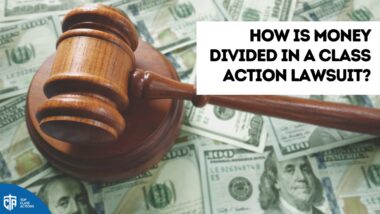Top Class Actions’s website and social media posts use affiliate links. If you make a purchase using such links, we may receive a commission, but it will not result in any additional charges to you. Please review our Affiliate Link Disclosure for more information.
A class action lawsuit is almost always a civil case that deals with violations such as negligence, fraud, labor law violations, and other civil issues.
What Is the Difference Between Civil and Criminal Legal Action?
Generally, civil law deals with disputes between two parties while criminal law deals with, as the name implies, crimes and their punishments.
Civil law usually results in compensation for injuries or damages as well as other types of relief. Civil law actions can be brought by any plaintiff who has sustained injury or damages from an alleged violation. Lawsuits under civil law may be used to handle the following issues:
- Landlord/tenant disputes
- Divorces
- Bankruptcy
- Child custody
- Breach of contract
- Property disputes
- Personal injury
- Defamation
- Other civil disputes
Unlike criminal law, which is limited to being prosecuted by federal or state governments, civil law can be filed by both individuals and administrative or government agencies. These larger authorities may file a civil lawsuit over the following issues:
- Scams (as is seen in Federal Trade Commission cases)
- Fraud (as is seen with cases from the Department of Justice)
- False Claims Act (a.k.a. whistleblower) issues
- Denial of public benefits
- Traffic violations
- Unemployment hearings or workers compensation
- Social Security or SSI benefits
- Discrimination and other civil rights violations
On the other hand, criminal law is used to prosecute people who commit crimes – whether they be felonies or misdemeanors. These cases can only be filed by state or federal governments. Criminal legal action is used to handle the following situations:
- Homicide
- Conspiracy
- Obstruction of justice
- Assault
- Drug possession
- Theft
- Other criminal violations
Unlike civil actions which can recover monetary compensation and other relief, criminal cases can result in punishments such as incarceration, fines, and, in extreme cases, even the death penalty. Misdemeanors are less serious forms of criminal violations which result in more lenient sentences with one year or less of incarceration. In contrast, felonies are much more serious and could result in incarceration from over one year to life.
In some cases, a situation can give rise to both criminal and civil violations. While some criminal verdicts require restitution paid to victim families, other situations could see the family file a civil lawsuit against the criminal perpetrator in order to recover compensation for damages.
One notable example of this is the O.J. Simpson case. The criminal charges against him were dismissed but he was still successfully sued in civil court by the victim’s family.
Generally, a criminal lawsuit requires a higher standard for burden of proof. A prosecuting party needs to have a nearly airtight case in order to win a criminal claim. With civil lawsuits, the requirements may be less strict to secure a favorable outcome for consumers.
 Is a Class Action Lawsuit Civil or Criminal?
Is a Class Action Lawsuit Civil or Criminal?
A class action lawsuit, in which one plaintiff aims to represent a Class of similarly-situated people, almost always deals with violations of civil law.
Class action lawsuits work well for civil violations, especially when violations are committed by an entity such as a prominent corporation. In these cases, numerous consumers may be affected by a civil violation which warrants their claims to be organized effectively in a class action.
An example of this would be an automotive company which may face civil allegations of having equipped their vehicles with defective features such as sunroofs prone to shattering. This defect would likely affect many consumers who owned or leased the affected vehicle, meaning that one plaintiff would be capable of representing car owners with the same issue.
In some cases, civil claims are too specific to each consumer to be consolidated in a class action. This often applies to personal injury cases where a plaintiff claims that the defendant’s negligence resulted in harm to them.
The nature of criminal cases makes it difficult to consolidate them in a class action lawsuit. Criminal law can only be prosecuted by state or federal authorities, meaning that individuals are not in the position to represent other parties because they are prohibited from bringing criminal cases.
Even if criminal violations also give way to civil violations, such as the family of a murdered victim seeking compensation, these cases are often too specific to be consolidated into a class action lawsuit.
In What Situations Would a Criminal Case Qualify as a Class Action Lawsuit?
More recently, federal prosecutors from the Department of Justice or other regulatory agencies have started to seek multimillion dollar settlements with corporations which benefit a large number of consumers. These cases are sometimes called criminal class actions since the persecution of criminal violations results in restitution of funds for victims.
“Like class action settlements, criminal class action agreements take advantage of economies of scale by efficiently compensating multiple people through a single, comprehensive scheme,” Adam S. Zimmerman of St. Johns University School of Law and David M. Jaros of University of Baltimore School of Law wrote in their University of Pennsylvania Law Review article.
“And while prosecutors, rather than private attorneys, negotiate the size of the award, the end result is typically a large fund managed by the very same private administrators who oversee civil class action settlements.”
The authors reference criminal lawsuits which provided large restitution funds for stockholders. This includes a 2004 agreement with Computer Associated which provided a $225 million restitution fund for stockholders affected by allegedly inflated quarterly earnings reports. Another example includes the federal prosecution of Bernard Madoff for criminal fraud which reportedly sought to distribute Madoff’s assets to defrauded victims.
Although these criminal class action lawsuits have the ability to result in payments for consumers, individuals are generally less involved in the process. In civil class action lawsuits, attorneys and the courts hear from affected individuals if they object to a settlement. Criminal law attorneys are not required to advocate for consumers when seeking settlements or determining distribution.
Zimmerman and Jaros argue that criminal prosecutors, unburdened by systematic checks and balances, should only serve in a criminal class action role when the government is in “a unique position to facilitate compensation.” In these special circumstances, the authors argue that prosecutors should adopt internal procedures which allow them to hear from victims or victim representatives.


 Is a Class Action Lawsuit Civil or Criminal?
Is a Class Action Lawsuit Civil or Criminal?













One thought on Is a Class Action Lawsuit Civil or Criminal?
I would like to talk to an attorney in regards to numerous civil rights violations in Pre-Trial facility in Visalia, California 93291. The Sgt at the facility abused his position, he violated my right to medical and mental health, he defamed my character telling deputy that I manipulated staff by having seizures, he stated he did not care about my medical history, he violated my release date with his abuse of power, I appealed the situation till it was exhausted.